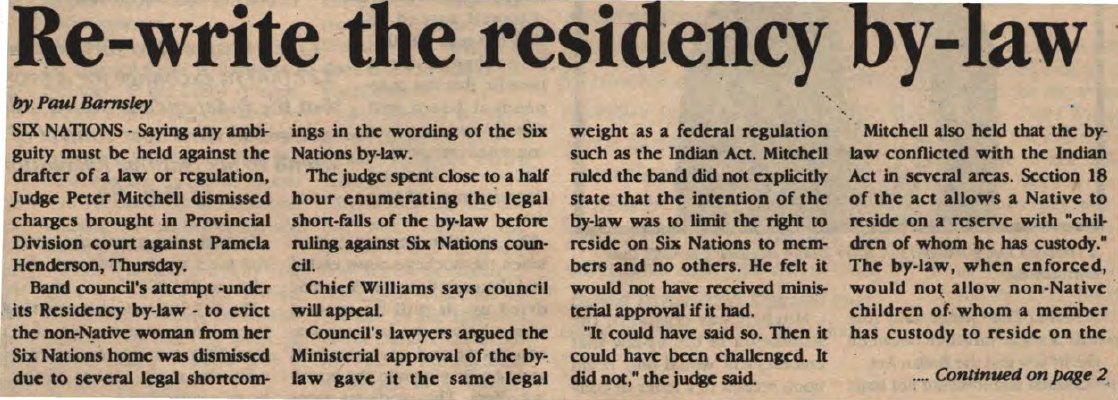"Re-write the residency by-law"
- Publication
- Tekawennake News (Ohsweken, Ontario), 26 Apr 1995, pp.1-2
- Full Text
- Re-write the residency by-lawby Paul Barnsley
SIX NATIONS - Saying any ambiguity must be held against the drafter of a law or regulation, Judge Peter Mitchell dismissed charges brought in Provincial Division court against Pamela Henderson, Thursday.
Band council's attempt - under its Residency by-law - to evict the non-Native woman from her Six Nations home was dismissed due to several legal shortcomings in the wording of the Six Nations by-law.
The judge spent close to a half hour enumerating the legal short-falls of the by-law before ruling against Six Nations council.
Chief Williams says council will appeal.
Council's lawyers argued the Ministerial approval of the by-law gave it the same legal weight as a federal regulation such as the Indian Act. Mitchell ruled the band did not explicitly state that the intention of the by-law was to limit the right to reside on Six Nations to members and no others. He felt it would not have received ministerial approval if it had.
"It could have said so. Then it could have been challenged. It did not," the judge said.
Mitchell also held the by-law conflicted with the Indian Act in several areas. Section 18 of the act allows a Native to reside on a reserve with "children of whom he has custody." The by-law, when enforced, would not allow non-Native children of whom a member has custody to reside on the
(Continued on page 2)
Residency by-law(Continued from front page)
reserve. The judge said that was a clear conflict between the by-law and the Indian Act.Council said it would not issue permits to non-Natives who wished to reside on Six Nations. Mitchell pointed out that the Minister of Indian Affairs has the power under the act to issue permits which the by-law would not recognize.
The judge also said the band misinterpreted the scope of its powers granted under section 81 (I) P2 of the Indian Act. He said council created the by-law under the assumption that it has the power to make by-laws which "provide" for the right of spouses and children TO reside on the reserve..."
The act actually reads: "provide for the rights of spouses and children WHO reside on the reserve..."
Mitchell determined the actual wording of the act did not give council the power it attempted to use when it enforced the Residency by-law in an attempt to evict the non-Native spouse of Dave Henderson, a band member.
The judge also ruled that providing a maximum jail term of 30 days for an offense which could be committed without moral turpitude was in conflict with section 7 of the Charter of Rights and Freedom. Section 7 guarantees Canadian citizens the right to avoid arbitrary detention.
After giving these reasons for ruling against council, the judge offered several opinions on the case.
"Band council should have been aware, when Mr. Henderson applied for a Housing loan, that he expected to reside there with his family," the judge said. "Council should have informed him at that time that, if he intended to reside with a non-band member, that would carry a 30 day jail term.
Mitchell was critical of the stipulation in the by-law that enforcement would only begin upon receipt of a letter of complaint.
"There has to be a scheme where the law is not perceived as unfair. The minute it is perceived as arbitrary it falls under the charter," he said, before asking Pamela Henderson to rise for his verdict. "The charge is dismissed."
Chief Williams, outside the courtroom, said, "I don't like the judgement, of course. I don't think the judge totally understood what we're talking about. We have 7,600 Bill C-31s coming back to the reserve. We can't afford to 7,600 non-Native spouses coming back with them. We only get funding for members. I don't think we can just open the doors."
Williams said council may redraft the by-law. He added a recent request from the Minister of Indian Affairs may come into play. "Minister Irwin asked the chiefs for help to change the Indian Act. We may raise this with him. We shouldn't need ministerial approval for our by-laws," the chief said.
Darrell Doxdator, the lawyer acting for the Henderson, was satisfied with the ruling.
"The defense was based on the ambiguity of the by-law and the Charter issue. I believe the decision shows band council will have to be more aware of the need for careful consideration on drafting further by-laws," he told the TEKA, after the decision was handed down.
The Hendersons were extremely emotional after hearing the verdict. "I'm just relieved it's over," said a smiling Dave Henderson.
Council lawyers have 30 days to file an appeal. An appeal must be based on an error in law contained in Judge Mitchell's ruling.
- Creator
- Barnsley, Paul, Author
- Media Type
- Text
- Newspaper
- Item Type
- Clippings
- Publisher
- Tekawennake News
- Place of Publication
- Six Nations of the Grand River, ON
- Date of Publication
- 26 Apr 1995
- Date Of Event
- 20 Apr 1995
- Subject(s)
- Personal Name(s)
- Mitchell, Peter ; Henderson, Pamela ; Williams, Chief Steve ; Henderson, Dave ; Doxtdator, Darrell.
- Corporate Name(s)
- Six Nations Elected Band Council.
- Local identifier
- SNPL004593v00d
- Language of Item
- English
- Geographic Coverage
-
-
Ontario, Canada
Latitude: 43.06681 Longitude: -80.11635
-
- Creative Commons licence
 [more details]
[more details]- Copyright Statement
- Public domain: Copyright has expired according to Canadian law. No restrictions on use.
- Copyright Date
- 1995
- Copyright Holder
- Tekawennake News
- Contact
- Six Nations Public LibraryEmail:info@snpl.ca
Website:
Agency street/mail address:1679 Chiefswood Rd
PO Box 149
Ohsweken, ON N0A 1M0
519-445-2954



